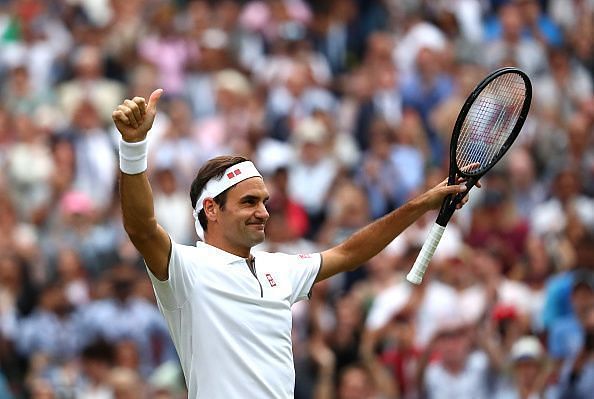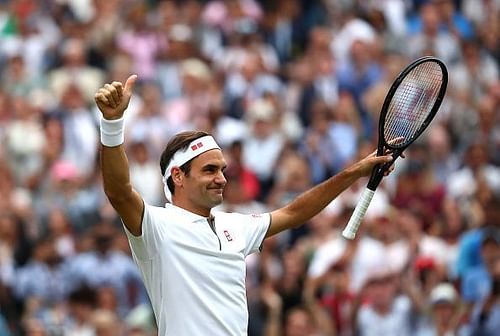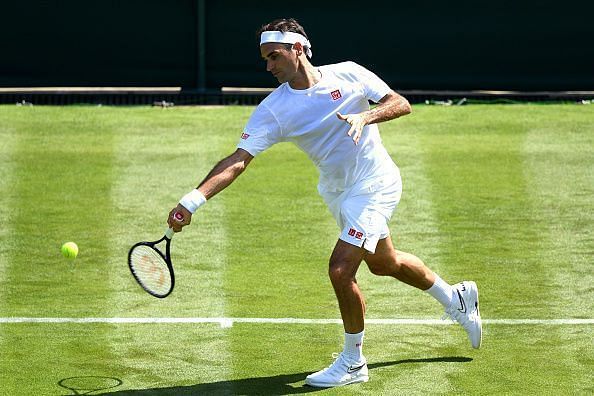
Roger Federer will never truly get the credit he deserves for his exploits since his return in 2017

I have to preface this by saying that I am an ardent Roger Federer fan - to the extent that he could have retired after winning the Australian Open in 2017, and I would not have any complaints or questions regarding his status as the greatest male tennis player of all time beyond that point. He had proved everything that he needed to prove, and his Grand Slam count was not the be-all-end-all in that regard. This entire article is from my point of view - seems obvious, but deserves mention.
One aspect of Federer's career that does not get nearly enough mention in relation to his 'biggest rivals' is the fact that he is full five-plus years older than Rafael Nadal and Novak Djokovic. His continued excellence in the latter stages of his career - stages that most players retire before - and the onslaughts of Nadal and Djokovic in the prime of their respective careers have produced this perception that Federer is a part of the same generation as those two - he really isn't.
Federer belongs to the same generation as Andy Roddick, Tommy Haas, Lleyton Hewitt, Fernando Gonzalez, Juan Carlos Ferrero - to name a few; those were his peers, and since none of them won enough against him, and are all long-retired, they escape the historicity of Federer's career, especially since the prominence of Rafa and Novak.
Roger's utter dominance over his former rivals has been forgotten and labeled as a run of easy success over a 'weak era' of players, which diminishes his achievements during that period. That would be no different than labeling the current NextGen of tennis as 'talentless' just because the Big 3 are usually winning.
In simpler words, Federer is not to blame for the lack of a same-aged rival during the prime of his career (a period which will always remain 2004-2007, no matter how many majors he has won and will win); on the contrary, it is a testament to his consistent brilliance - evident in his consecutive 237 weeks at the top of the ATP rankings from 2003-2008 - which was absolutely unrivaled at his peak. 'Big 3' implies that there are three players, the Crème de la crème of men's tennis, each of whom can get the better of the other two on any given day. For all intents and purposes, Federer was the Big 1 before there was a Big 3.
That said, I sincerely believe that the Djokovic-Nadal rivalry is the center-piece of this era of tennis. Federer's individual record against each of them will likely only worsen (even though he just beat Nadal at Wimbledon, making it 6 wins in the last 7 matches against his storied rival) the closer he gets to 40, and even beyond 40 (hopefully, since tennis is better off when Federer is an active competitor). I do not believe that a negative head-to-head record against those two henceforth hinders his legacy since he is not operating at the peak of his mental and physical powers, which is hard to believe since he is still winning so much. His improved backhand and sustained agility seem to have masked that undeniable biological fact.

Djokovic started making a significant mark on men's tennis when he had a historic run in 2011, besting one and all (except for Federer at Roland Garros that year). He has been the best player of this decade by a mile. In 2010, Nadal had 6 major titles to his name, Federer had 16, while he had just one. On July 15, 2019, after Wimbledon, Federer's tally stands at 20, Nadal has 18, and Djokovic just won his 16th (5th at Wimbledon), after saving two championship points against Roger. Since the turn of the decade, Djokovic has won 15 Grand Slams, with age ostensibly affecting him the least so far among the Big 3. The Djoker's mental prowess and clutch performances have become a hallmark of his career.
Nadal was a prodigy, winning the French Open as a teenager, which was the beginning of perhaps the most successful player-event association in the history of not just tennis, but modern sport. His success on clay expands with virtually every Roland Garros, and he continues to re-invent himself and improve despite injuries and advancing age. He is a major threat on every surface he plays on, accentuated by his tenacity and wicked topspin play.
I do not wish for this article to be perceived as a slight to Nadal or Djokovic, both of whom are stellar ambassadors of the sport and have well-documented claims to the G.O.A.T. debate, which anyway is not at the heart of this piece. They are the two most relevant players of this 'generation', and they have to contend with the sustained brilliance of Federer every once in a while.
This current era of tennis starts and ends with Djokovic-Nadal, with the Swiss Maestro chiming in with age-defying magnificence at some notable junctures of the ATP season. Wimbledon and grass always, Australian Open since his 2017 return, every indoor hard court tournament - those are the usual suspects.
Roger Federer has won three majors since returning to the tour at the Australian Open 2017. He keeps beating top 10 players, often with effortless nonchalance. He is weeks shy of turning 38, and he seemed fresh after 4 hours and 55 minutes on Center Court at Wimbledon, the hallowed site to 8 of his 20 major victories.
I cannot say whether Djokovic and Nadal will reach finals and win majors at the age of 37, but at Wimbledon 2019, Federer was a point away from becoming the first player to have beaten both Nadal and Djokovic at the same event to win the tournament. (Roger beat Djokovic and Murray to win in 2012). He handled the excruciating loss with impressive-yet-typical class.
There is still a lot of gas left in the tank, and the further up in age he gets, the more unbelievable his exploits become, and the more taken-for-granted his efforts and ability are by fans, the media, and especially critics. I'll end on a note that is clichéd, but devastatingly true: enjoy the rest of his career, however long or short it might be.